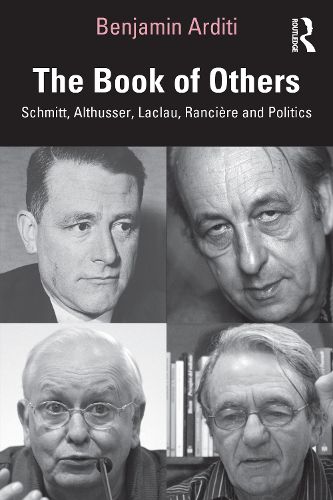Readings Newsletter
Become a Readings Member to make your shopping experience even easier.
Sign in or sign up for free!
You’re not far away from qualifying for FREE standard shipping within Australia
You’ve qualified for FREE standard shipping within Australia
The cart is loading…






In The Book of Others, Benjamin Arditi examines the enduring theoretical influence of four major political thinkers-Carl Schmitt, Louis Althusser, Ernesto Laclau, and Jacque Ranciere-whom he frames as "others" central to shaping contemporary understandings of politics. Arditi situates these figures within the terrain of post-foundational thought, emphasizing their skepticism about transcendental grounds in political theory. Through chapters focused on themes like modernity, constituent power, decisionism, ideology, hegemony, post-hegemony, populism, and dissensus, the book explores how each thinker redefines the political as a space of contestation rather than a settled domain.
This is no exegetical exercise. Arditi challenges canonical interpretations by exposing the internal tensions and ambivalences in each thinker's work. He treats their published texts as provisional interventions rather than their last word on a particular subject, approaching them as intellectual sparring partners in a form of conceptual shadow boxing. Through this dynamic and polemical approach, Arditi pushes their ideas into directions they either did not anticipate or deliberately avoided. The result is a nuanced understanding of post-foundational political thought and makes a compelling case for thinking both with and against influential theorists.
The Book of Others significantly enriches critical political analysis, offering a substantive contribution to post-Marxist, democratic, and critical theory.
$9.00 standard shipping within Australia
FREE standard shipping within Australia for orders over $100.00
Express & International shipping calculated at checkout
In The Book of Others, Benjamin Arditi examines the enduring theoretical influence of four major political thinkers-Carl Schmitt, Louis Althusser, Ernesto Laclau, and Jacque Ranciere-whom he frames as "others" central to shaping contemporary understandings of politics. Arditi situates these figures within the terrain of post-foundational thought, emphasizing their skepticism about transcendental grounds in political theory. Through chapters focused on themes like modernity, constituent power, decisionism, ideology, hegemony, post-hegemony, populism, and dissensus, the book explores how each thinker redefines the political as a space of contestation rather than a settled domain.
This is no exegetical exercise. Arditi challenges canonical interpretations by exposing the internal tensions and ambivalences in each thinker's work. He treats their published texts as provisional interventions rather than their last word on a particular subject, approaching them as intellectual sparring partners in a form of conceptual shadow boxing. Through this dynamic and polemical approach, Arditi pushes their ideas into directions they either did not anticipate or deliberately avoided. The result is a nuanced understanding of post-foundational political thought and makes a compelling case for thinking both with and against influential theorists.
The Book of Others significantly enriches critical political analysis, offering a substantive contribution to post-Marxist, democratic, and critical theory.